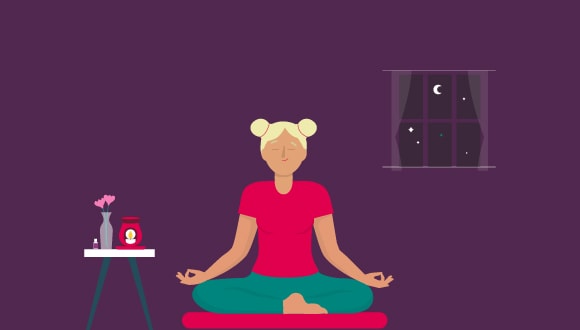Can you really catch up on sleep?
Published July 2024 | 5 min read
Expert contributors Dr Prerna Varma, research fellow at the Turner Institute for Brain and Mental Health in Monash University’s School of Psychological Services; Steven Perlen, CEO of Sleepfit Solutions
Words by Carrie Hutchinson
Getting enough sleep is one of the most important lifestyle factors affecting our wellbeing. Here’s why you should take it seriously, with tips to get a better night's sleep.
We all know the feeling… The alarm goes off, but you feel as if you only just closed your eyes. You hit snooze and the alarm goes off again a few minutes later. Still, you don’t feel any better. If only you could get some extra sleep.
If this happens to you occasionally, there’s probably little cause for concern, says Dr Prerna Varma, research fellow at the Turner Institute for Brain and Mental Health in Monash University’s School of Psychological Services. But if this is an almost daily occurrence, you likely have sleep issues.
“We know that at least 30% of people have insomnia, which is when they have trouble falling asleep, take time to fall asleep, wake up in the middle of the night, or have early morning awakening, so they don’t feel refreshed,” says Dr Varma. “But, in general, we know a lot of Aussies are not getting enough hours of sleep, regardless of whether they have insomnia. We have a sleep epidemic going on.”

But how much sleep is enough?
Most experts, including Dr Varma, recommend adults get between seven and nine hours of sleep every day, while the Sleep Health Foundation lists eight hours and 15 minutes sleep as the ideal adult average. Children need more and while we tend to suffer from less quality sleep as we age, we should still be looking to get around seven to eight hours in our senior years.
Anyone struggling with tiredness can investigate their sleep hygiene with an app like Sleepfit, which is free for eligible HCF members. Sleepfit will ask you to answer questions that screen for common treatable sleep disorders.
“The app identifies somebody at higher risk,” says Sleepfit Solutions CEO, Steven Perlen. “They’re then triaged onto treatment pathways. For HCF members, that can include referral to some of the physical and psychological health services it offers.”
These health services can identify whether lack of sleep is caused by the lack of sleep hygiene, a parasomnia (e.g. sleepwalking, night terrors, sleep talking, sleep eating) or a condition like insomnia or sleep apnoea.
The effects of not enough sleep
Being constantly tired affects people in more ways than just making your workdays interminable.
“There’s a lot of evidence to show that if you’re not getting regular amounts of recuperative sleep, there are short-term implications for things like your cognitive ability, so your ability to make good decisions, your emotional state and your propensity to have an accident,” says Steven.
Along with diet and exercise, sleep is one of the pillars of good health. Steven, though, believes it is the most important.
“What we know from the research is that if you’re not getting good sleep, one of the first things impacted is your diet, because you're constantly craving high-carbohydrate foods to keep you awake and perky,” he says. “That starts to have an immediate impact on your physical health, leading to increased risk of things like obesity. Again, we know from research, if you're not getting enough sleep, it’s very hard to find the energy and motivation to do regular exercise.”
The long-term risk factors of sleep debt
Allowing insomnia and other sleep disorders to go untreated can have significant long-term effects on your health, including your mental health.
“When you’ve had quite a long period of time where you're not getting enough sleep, it can affect your mental health,” says Dr Varma. “We know depression and sleep have a strong relationship – there’s a high risk of experiencing depression symptoms if you have insomnia-related symptoms as well.”
Other than depression, there are strong links between sleep and anxiety as well. Adults with depression or anxiety are twice as likely to experience sleeping issues, further perpetuating a person’s anxiety, says Dr Varma.
As well as decreased mental health, a long-term sleep debt can weigh heavily on your physical wellbeing, increasing the risk of many common diseases, including type 2 diabetes, high blood pressure and heart disease.
Can you catch up on sleep?
Many everyday factors can put you into sleep debt. New parents, for example, can lose between 400 and 750 hours of sleep in their baby’s first year, according to the Queensland Brain Institute. It could also be you’ve had a busy time at work or simply like sitting up until 2am playing video games.
“Assuming you don’t have a sleep disorder and your lack of sleep is because of these psychosocial factors, you can get rid of sleep debt by getting the sleep you need,” says Steven.
That might mean a sleep-in on the weekend or going to bed a little earlier, every now and again. Even just a few nights of restful sleep can help you erase sleep debt.
Tips to help you sleep deeper
“I would say sleep is one of the more modifiable things you can change in your lifestyle that can improve your overall health,” says Dr Varma.
There are several ways to help improve your sleep, says Dr Varma. These include consistency of sleep hours (going to bed and waking up at the same time every day), ensuring your environment is dark, quiet, comfortable and the right temperature, limiting coffee and alcohol intake close to bedtime, and turning off screens more than an hour before going to bed.
Nightly relaxing routines, like meditation or writing in a gratitude journal, can also help enhance the quality and duration of sleep.
Dr Varma recommends another practice: “A good night of sleep usually begins with what you do during the day. One of the main things you can do is get some bright light outside, first thing in the morning.”
This activates your circadian cycle (your body clock), making you feel more alert during the day.
“As you go through the day, dim the lights a little bit, mimicking the pattern of light you get in the outside environment,” she says. “And an hour or two before your bedtime, dim the lights in your room.”

Sleep better
Thanks to our partnership with Sleepfit Solutions, eligible HCF members* can get a free 12-month subscription to the Sleepfit app designed to improve sleep and overall wellbeing^.
When to see a doctor
Sleep issues can be straight forward or they can be a symptom of another condition, so it’s important to talk to a health professional and consider factors such as overall health, lifestyle, diet and family health history.
If your quality of sleep is affecting your health and your day-to-day life, the first thing to do is speak to your regular GP, or you can book a telehealth appointment, via HCF’s partnership with GP2U, an online video GP service.
Once your GP has investigated any underlying cause for your sleep issues, they can refer you to a specialist, if necessary. You can also access a range of evidence-based online treatment programs through This Way Up^, an online cognitive behavioural therapy that offers support for insomnia, stress, anxiety and depression. The programs are free of charge for members when they are prescribed by a clinician.
Related articles
How to improve insomnia
Women are more likely to experience insomnia than men, due to hormones and higher rates of anxiety. Struggling to sleep? Here are some expert tips.
Do blue light glasses work?
Blue light from our screens can affect our body clock. Experts explain how blue-light blocking lenses work and if you should get them for own glasses.
Why alcohol and sleep don’t mix
Relying on alcohol impacts the quality of your sleep, and can lead to other health risks. Here’s how to break the cycle.
Workplace stress solutions
Access to mental health support programs, psychologists and sleep apps are some of the ways you can get support from your health cover.
IMPORTANT INFORMATION
* Eligible HCF members with hospital or extras cover can get a free 12-month Sleepfit subscription (RRP is $29.90). Excludes Overseas Visitors Health Cover.
^ This service is not affiliated or associated with HCF in any way. You should make your own enquiries to determine whether this service is suitable for you. If you decide to use this service, it’ll be on the basis that HCF won’t be responsible, and you won’t hold HCF responsible, for any liability that may arise from that use.
This communication contains information which is copyright to The Hospitals Contribution Fund of Australia Limited (HCF). It should not be copied, disclosed or distributed without the authority of HCF. Except as required by law, HCF does not represent, warrant and/or guarantee that this communication is free from errors, virus, interception or interference. All reasonable efforts have been taken to ensure the accuracy of material contained on this website. It’s not intended that this website be comprehensive or render advice. HCF members should rely on authoritative advice they seek from qualified practitioners in the health and medical fields as the information provided on this website is general information only and may not be suitable to individual circumstances or health needs. Please check with your health professional before making any dietary, medical or other health decisions as a result of reading this website.